Key Notes
-
A New & Improved klas.com
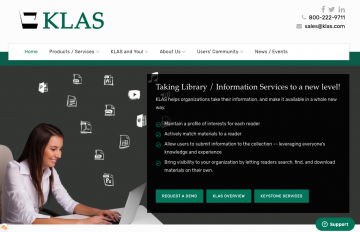
In March of this year, Katy and I undertook a rather large project that we're now happy to see come to fruition. For the past few years, we've been discussing updating the look and feel of Keystone's website with the goal of creating something more modern, with some additional features, but still maintaining our commitment to providing info on an easy-to-use and easy-to-navigate site. To help us with this endeavor, we chose to work with Alison Meeks of AM Graphix. We're excited to say that as of yesterday, the new and improved klas.com is now live!
The content we previously provided is still available, but we hope we've enhanced it and made it all easier to find. One of the great new features we added for current KLAS Users is the ability to submit a "Support" request from any page on the site using the "Support" button in the right-hand corner. Also, the whole site is mobile-friendly and responsive to the size of your browser window.
Below are some additional screenshots of the shiny, new klas.com. We invite you to spend some time checking it out!
The Current Customer OPACs page has been updated to a modern, graphical style, showcasing the logo of each library or organization in addition to the text name. It has also been broken into new sections: Featured, Talking Book Libraries, and Instructional Resource Centers. (Note: Prefer a text-only approach? We've added that version of the list to the KLASusers.com menu!)
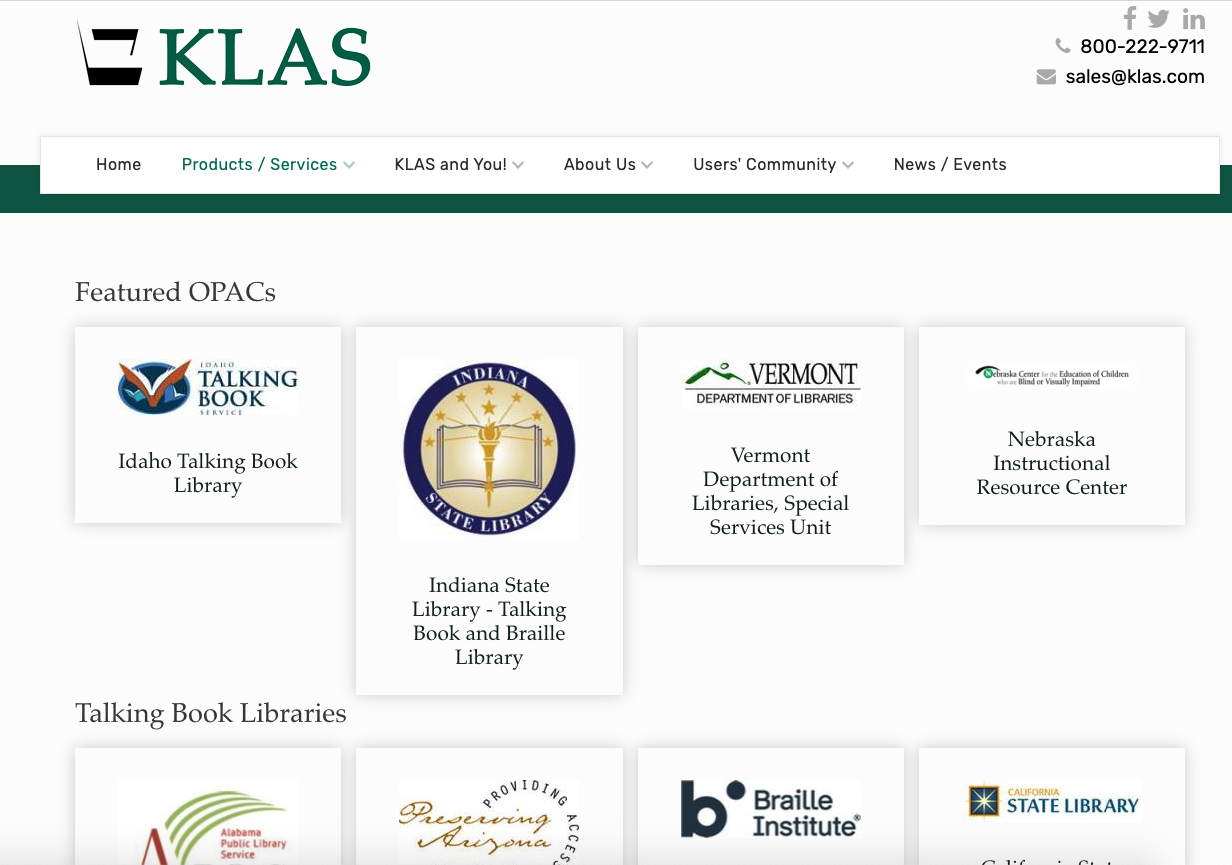
The Products and Services: Scribe Duplication System page is new! It includes information about the Scribe, as well as some photos.
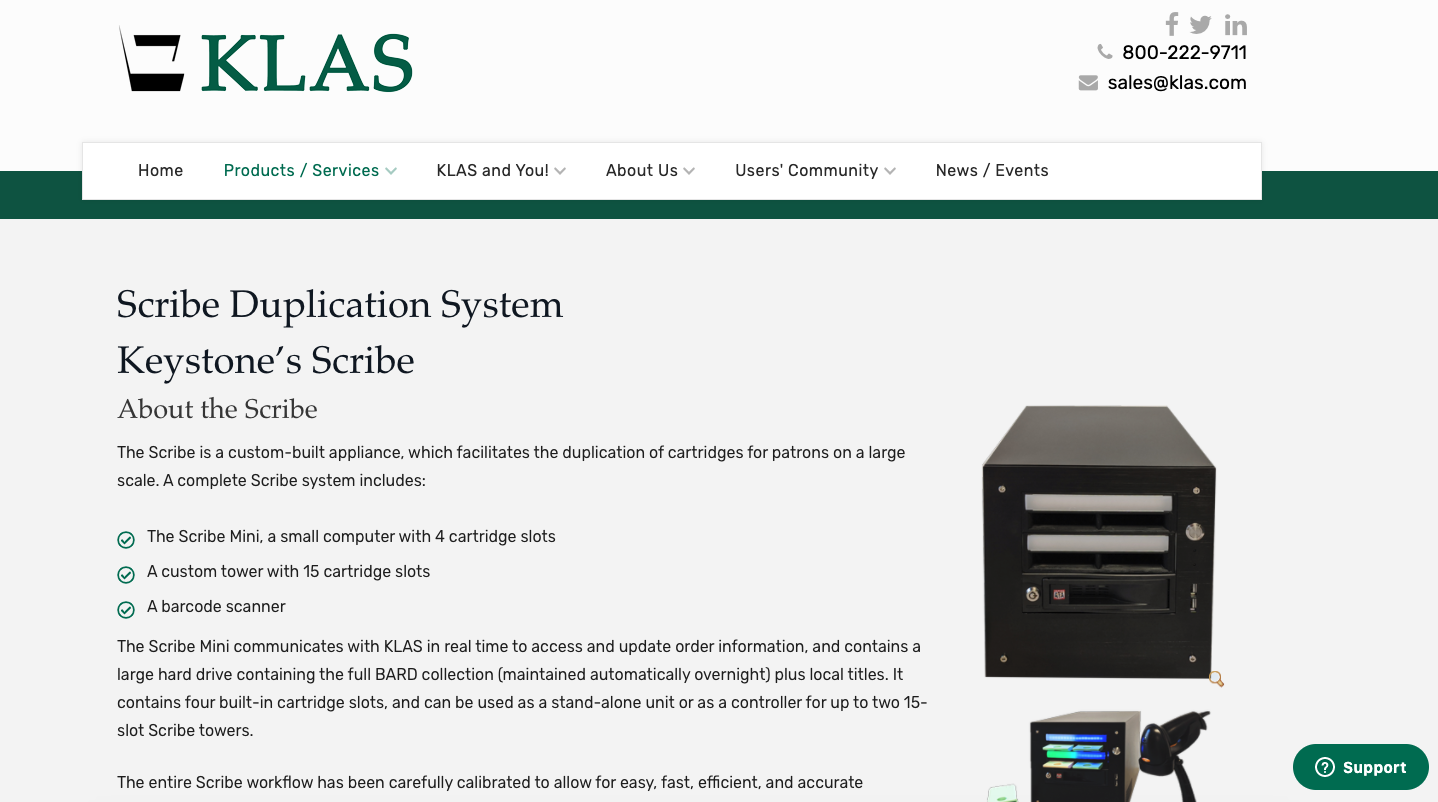
We've included some new testimonials from KLAS users on the home page. Thank you to everyone who provided a quote for us--we appreciate your kind words and support!
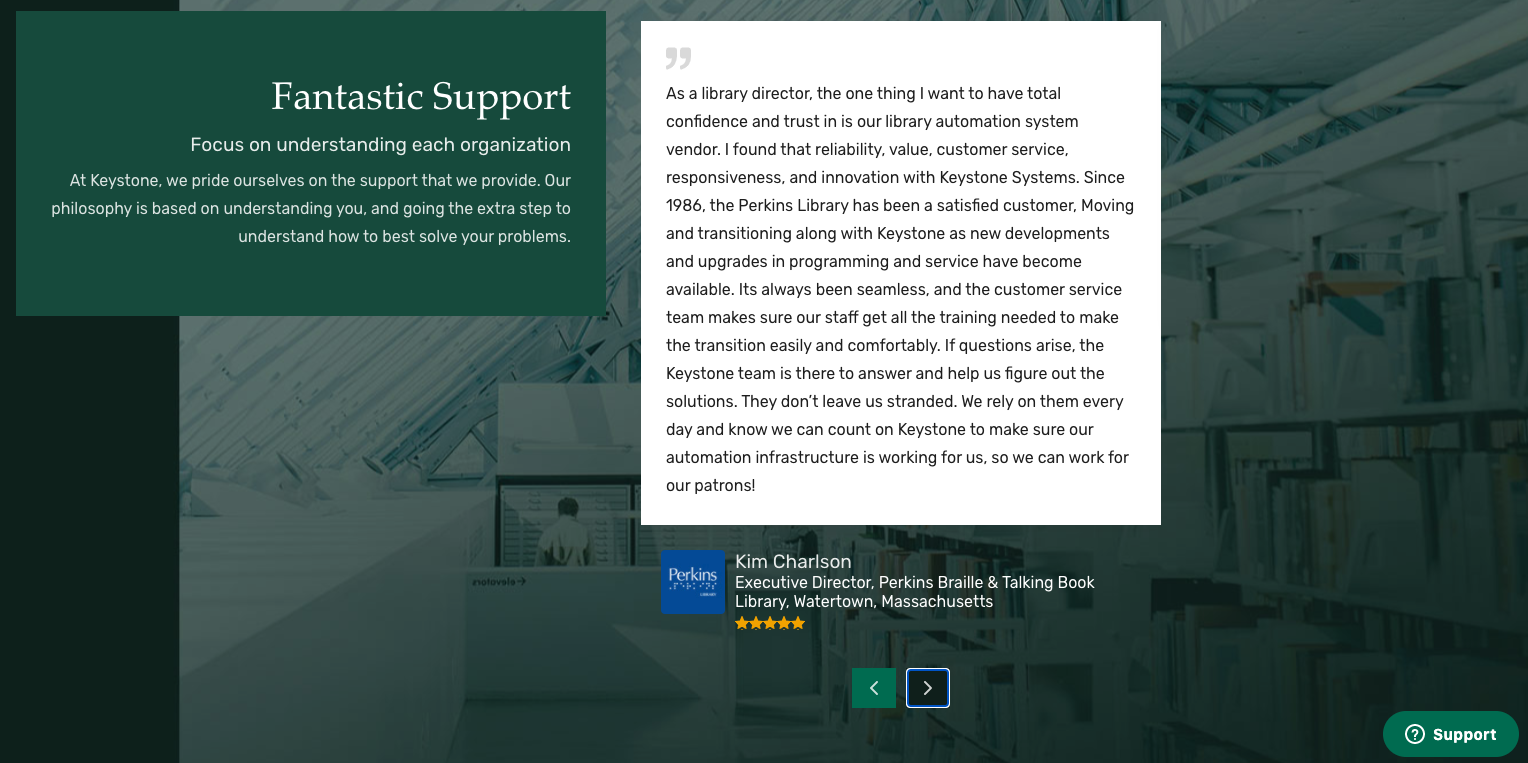
Finally, this is and will be an ongoing effort. Now that the new look and new organization is in place, we have plans to edit much of the content, so we'd love to hear your feedback!
-
A new way to Meet
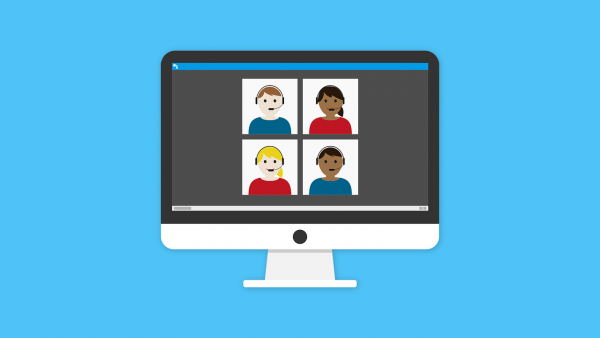
A couple of years ago now, we started offering webinars to help keep the Users’ Group informed and connected, from the open forum KLAS Q&A with Katy webinars to library-specific Duplication training webinars. As we transition to an every-other-year conference format, we’ve ramped up the webinar schedule, including user-led sessions and roundtables in addition to our Keystone-presented sessions.
COVID has only increased the need and popularity of these sessions—and not just for us, but for everyone who uses webinar platforms.
For most of the past few years, we’ve been using Join.Me and had mostly positive experiences and feedback for its ease-of-use and reliability. However, with offering so many more webinars to a broader selection of our users, and with Join.Me’s servers a bit bogged down from increased use, there was a definite shift.
This was particularly apparent in the Keystone Updates and New Features in KLAS sessions that we held in place of our usual Users’ Group meeting during the online NLS conference. The turnout for those sessions was fantastic, but unfortunately caused a few technical issues as our platform and our moderator struggled to keep up with the turnout.
In light of all that, we started the search for a replacement.
This month, we are officially making the switch to Google Meet. From our testing in-house and with a few pilot meetings, we’re confident that it will be easier for us as hosts, and will see a lot less of the lag that was plaguing our attendees.
It also has some features that we think will prove beneficial, including automatic captioning, and the ability to show attendees’ webcams in a tiled display for a better “round-table” feel. You’ll be able to enable or disable the captioning and change views any time to suit your preferences, so give it a try!
You do not need a Google account to join us using Meet! However, if you are logged into a Google account, it’ll automatically bring you into the meeting with that account name. If you don’t want your personal or otherwise irrelevant Gmail name visible make sure to log out or switch accounts before joining the meeting.
We hope you’ll try it out and join us at the upcoming Virtual Programming roundtable this Thursday or at one of our other upcoming webinar sessions! Hopefully, this will be an improvement for everyone who had technical difficulties or bandwidth issues with Join.Me. If you do have any feedback about the new platform or difficulties joining a session, please let us know as we keep working to provide excellent online sessions!
-
A Note from James, plus Tips & Tricks part III

First, we'd like to share a note with you from James Burts, Keystone Executive Vice President,
"Dealing with the new realities of Covid-19 has certainly been a very strange time. At Keystone, we began having staff wanting to work from home and self-isolate on March 12th, and over the following 2 weeks had increasing numbers of staff opting to work from home. As of March 30th, our local county mandated that we all self-isolate and work from home. I certainly hope you’ve not seen a change in our ability to support you all.
Fortunately, we’d already taken the steps necessary to allow all our staff to work from home effectively— steps we’d taken expecting that it would help us in the event of a snowstorm or hurricane that made roads unsafe. Instead, the road are nearly empty, but it’s simply getting people together that’s unsafe. Who would have thought??
We continue to be available to help you and your staff in anyway we can. Whether that’s helping create new workflows to quarantine materials, or helping your staff work on record cleanup while they are working from home without access to your collection— we are here for you all. We have provided some ideas for managing these strange times on KlasUsers.com, and are always interested in hearing other ideas you may have. If you have any questions, or any ideas that you would like to implement, please reach out to us. We’ll be happy to help talk through your thoughts, and help address your needs."
Next up, as part of our ongoing work to support you, a few more tips and tricks, this time for:
- Strategies for serving patrons when you have a restricted card run
- Blocking service to prisons or other institutions
Or you can follow these links for our previous suggestions:
- How can you connect to KLAS if you use a Mac?
- How can I quickly increase the number of books we're sending our patrons and / or titles we're duplicating onto a cartridge for them?
- Do I need to shut off Nightly?
- WebOPAC Notice
- Emailing your newsletter
- Record clean-up
Tip 1:
Strategies for serving patrons when you have a restricted card run.
Nightly sorts patrons that need service by:
- Serve Code (least frequent to most frequent, with List Only ahead of Autoselect)
- Last Served date (none to oldest to most recent)
This gives priority to patrons who haven’t been served for a while, and gives List Only patrons a better chance of getting their titles before they go out to Autoselect patrons. Under normal circumstances, this setup ensures that everyone will be served in a reasonable timeframe, even if you restrict your card run and don’t get to everyone who needs service each day.
However, these are not normal circumstances. If you’re currently running on a skeleton crew and severely limited card run, your Nightly Auto patrons might languish at the end of the list.
While these circumstances are in place, or even when the floodgates re-open and you need to play catch-up, you may want to switch up this order from time to time. If you would like to change up the order of the Nightly sort to give different patrons a shot at getting books, please contact Keystone Customer Support—and then be sure to let us know when we should put it back.
Tip 2:
Blocking service to prisons or other institutions:
If your Department of Corrections requires that service is suspended during this time, we can apply a block to all inmates for you. This will stop all circulation to those patrons for a specified period of time, though it does not impact their NLS direct magazines. Please let us know how to identify incarcerated patrons (such as by Patron Type), and how long you need the block to remain in place.
If a nursing home or other facility requests that you stop service to their patrons, you can apply a similar block. You would first need to set up a "Quarantine" block (let us know if you need assistance). Then, find the patrons who live in that place and add the block to each record. If you don't already have relationships set up linking the patrons to the facility, you can find them by querying on the address.
Quick Search –
- Main Status | Equals | A
- City | Equals | Raleigh
Advanced Search –
- Address | Street Address | Matches | 8016 Glenwood
This query will limit your results to active records in the target city, with an address matching the facility’s street address. The idea is to be just specific enough, hence why I recommend searching the street address only for the number and street name. If it isn’t a common street, you might even leave off the number, and review results to see if the facility has multiple buildings.
And that's it for this week's tips! We hope these have been helpful for you; please continue to let us know how we can help!
-
A Snowy Day in Raleigh
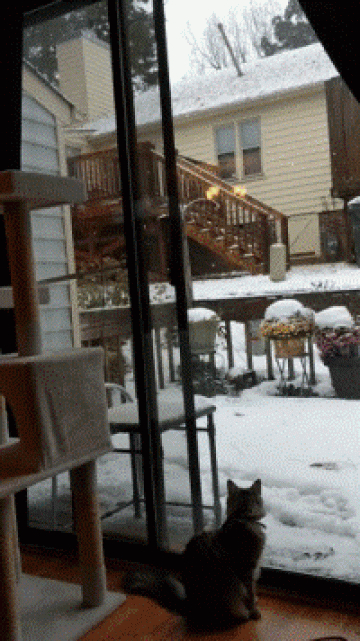
For this week's blog post, we thought you'd enjoy some of our staff's photos of the snow we got in Raleigh over the last couple of days.
Let's start with a .gif of Katy's cat Paws watching the snowfall through the sliding glass door of her townhouse.
Here was Drea's view out her home's front door on Monday.

Also, these two pictures of the table, chairs, and pergola on her upper deck show just how much snow accumulated. We got approximately 7 inches of snow on Sunday and even more fell on Monday morning. Raleigh usually averages 6 inches of snow total per season.
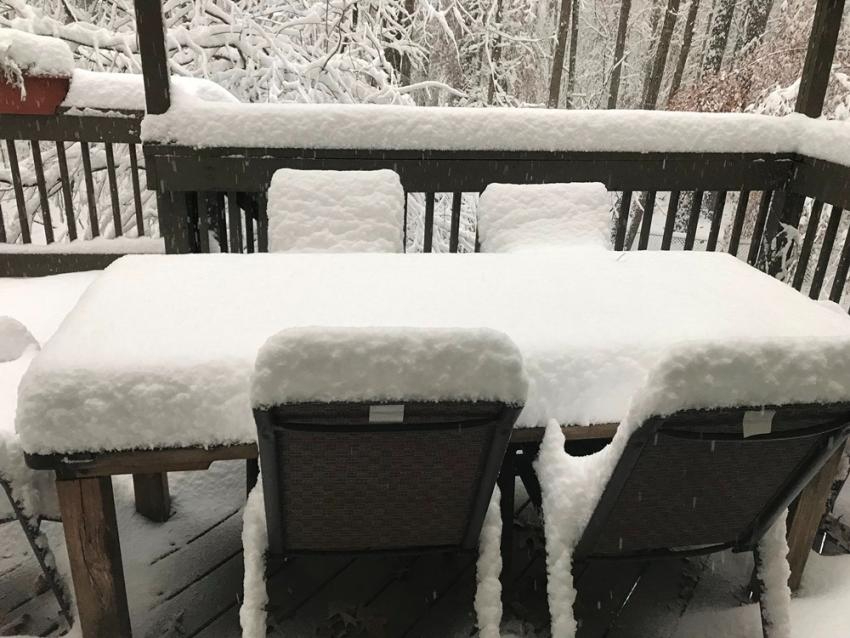
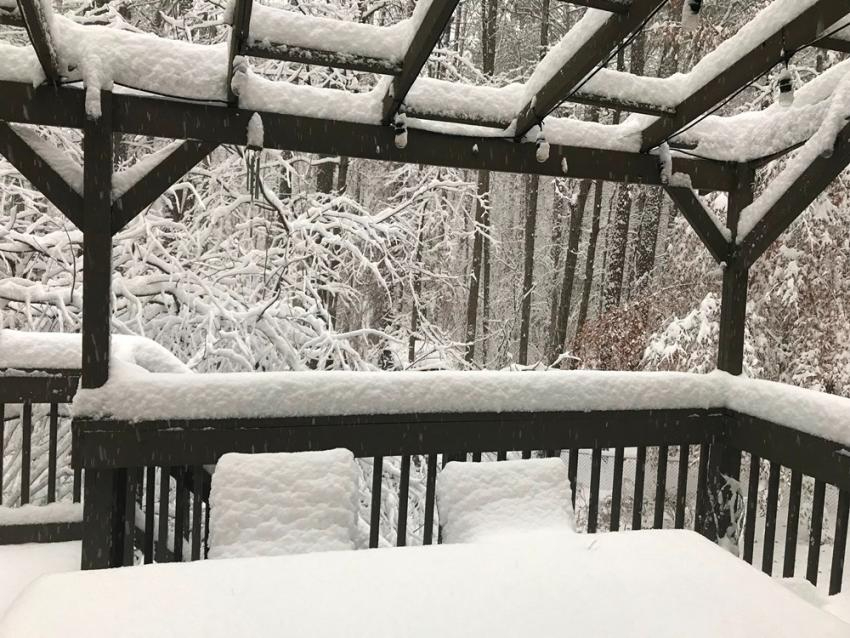
Finally, this is what her backyard looked like blanketed in all the white stuff. Her dogs definitely didn't appreciate it as much as she did. You can see their tracks going off the lower deck and around the firepit.
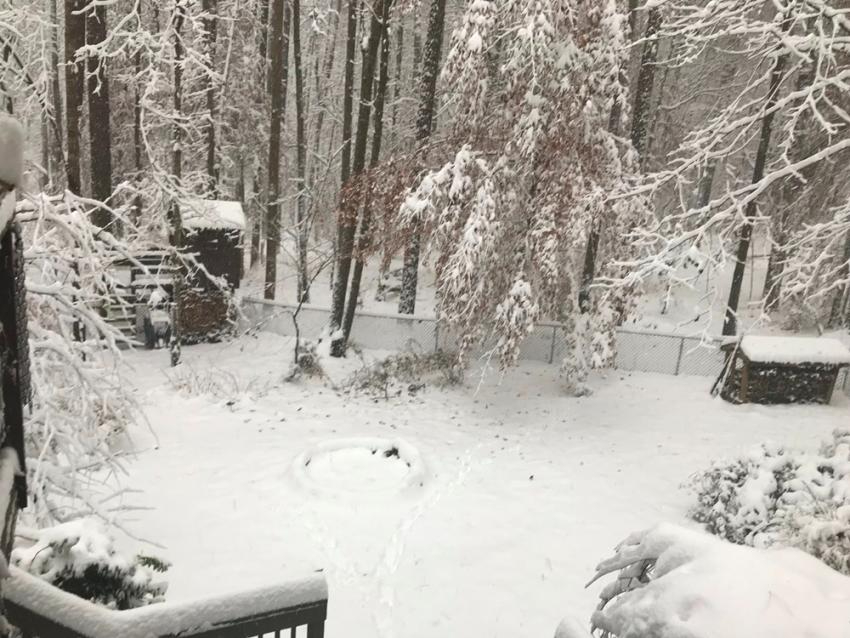
Nancy shared this picture trees in her backyard covered in snow.

Katy also enjoyed the snow on the tree outside of her window.

And, her kitty, Paws, enjoyed watching it fall through the large sliding glass door.
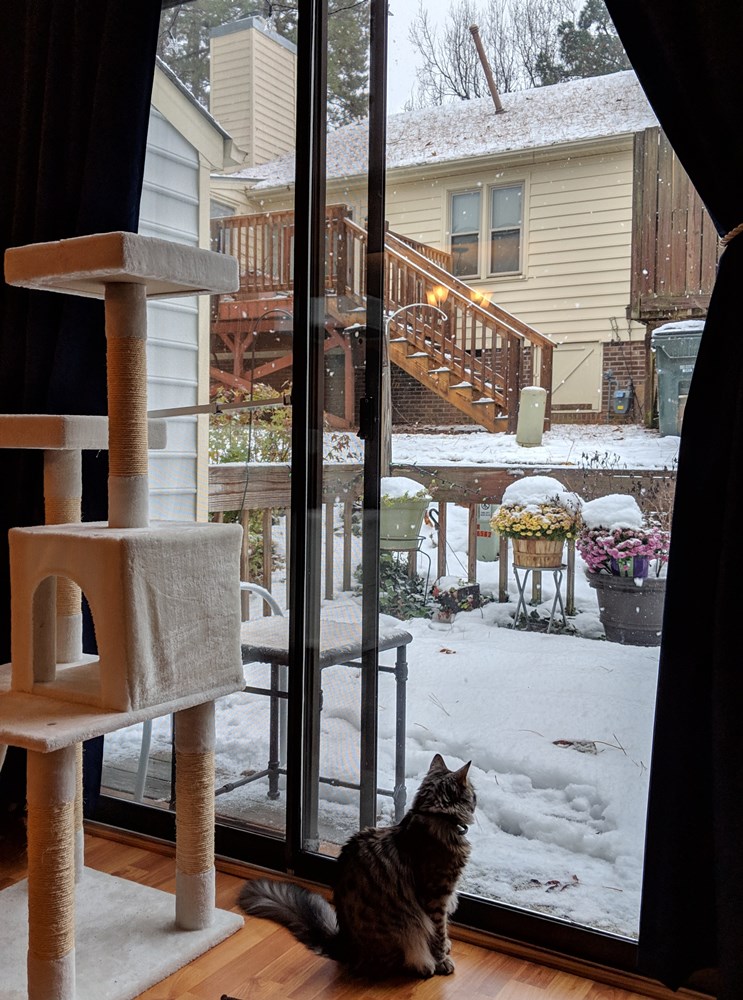
-
Administrator’s Training – What to Expect
Hopefully you all know that we routinely offer Administrator’s Training sessions. But what actually happens at these sessions? How can you justify the travel and registration costs? This week, I’m aiming answer some of those questions!
What is it?
A two-day intensive training course, offered here at our offices in Raleigh, NC. You can read up on details, download the registration form, and check the currently scheduled session dates here.
In addition to the scheduled course topics, Admin Training is a great time to get into all of those nitty-gritty administration and policy questions, both with your trainer here at Keystone and your fellow attendees. Class sizes are small, capped at a maximum of just six attendees, so there’s lots of individualized answers and attention to your situation.
Best of all, you will be training on your own database! Not the Users’ Conference database or another mock-up with fake data and semi-arbitrary settings—your very own (live or training, depending on how brave you are) database, with your own settings, your own data, and your own patrons.
What can I expect?
Your training will take place in our dedicated Training room, which (as you know, if you’ve been following this blog or our social media) will soon be freshly renovated. You will be on a workstation set up with remote access to your own database. Your trainer—probably Nancy—will also have a workstation and a projector, so you can see how it’s done, follow along, and make changes yourself as desired.
The schedule is pretty packed! You’ll be covering a lot of ground in relatively little time. The aim is more for you to understand your options, to know the various controls and information available to you, than for you to learn and remember exactly how to use everything. The small class size allows you to delve deeper into areas that are useful to you, while breezing through areas that you either already have a good handle on, or just don’t have much use for.
North Carolina Talking Books is just a short drive away, so if you’re interested in a field trip, we can usually set something up. And of course, you’ll have opportunity to try some of Raleigh’s amazing cuisine and to meet the Keystone staff.
What will I learn?
You can download the list of course topics from the info article, but here are some highlights with a bit more information:
- Nightly Configuration
This is always a popular Users’ Conference topic, but tackling it at Administrator’s Training will let you address your own settings as they are, and really get into the options available to make it work just right for your library. Fine-tuning your Nightly Configuration can help increase your circulation and even make the process more efficient.
- Maintenance and Control Files
KLAS allows an incredible amount of control over your own policy settings, so much that it can be hard to know or even for us to list all the things you can adjust. Your trainer can take you through it and help identify areas you may want to examine or reconsider. Take charge of your settings to enforce your federal, state, and agency policies, and to provide the high level of service your patrons rely on.
- Reports
Learn how to use the various reports available to you, and how to most effectively get at the information you need. By better understanding reports, you can provide more telling information about the work you do to your funding agencies. I will be providing more Key Notes posts about various reports, but again, nothing can compare to the value of seeing it work live and being able to test different setups on your own database.
Attendee Feedback
In September 2020, we conducted our first online KLAS Administrator's Training session. It was very much a trial run intended to make sure it met the goals we set out for it. So how’d it go?
We asked the attendees for their feedback, and here are a few of their comments...
“I really learned a lot from all of the sessions. I have this problem of not knowing where to start searches and Mitake took care of some of that. I am glad you asked everyone if we could record it. I have gone back a couple of times to see something that I had missed.
I am also glad that there are takeaway lessons and the manual for future reference.” Shawn Lemieux
“I would like to first say thank you for providing the training for us, it really helped me understand many processes of KLAS that I had heard about from John, but now I have an actual context and understanding of them.
I really liked the presentations as a whole; if I had two monitors it would have been perfect because I could follow along and go through the motions along with the demonstration, so for people with access to two monitors it would be even better! I found them easy to follow along as well, especially considering my background is not in libraries or library science, I was afraid it might have a hard time, but I managed fairly well. I would definitely recommend this training to others, and if I am in a management position in the future here I would definitely make sure to have employees attend the training as well.” Adam Smith
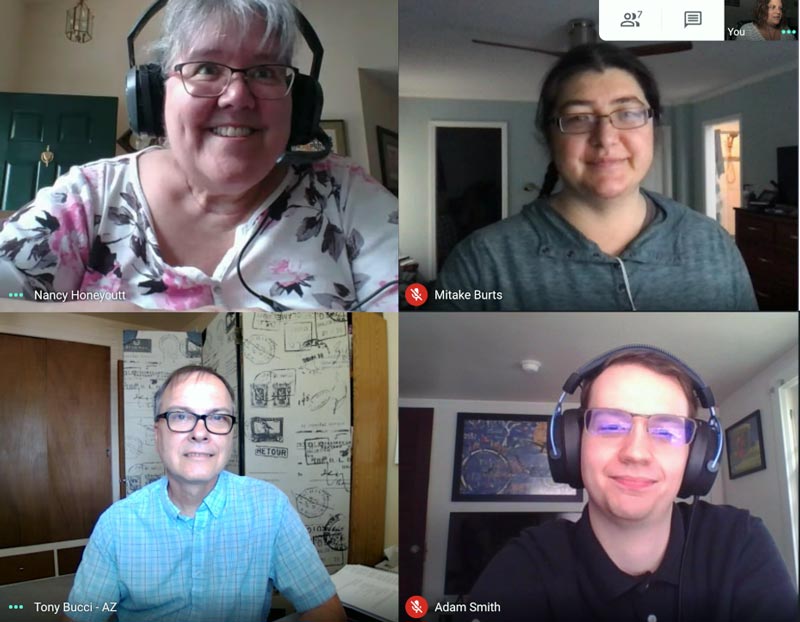
The above screen shot of the training session shows Nancy, Mitake, and two of our attendees, Adam and Tony. Everyone is smiling and having a good time.
In short, it was was a success, and we now regularly offer Online KLAS Administrator’s Training sessions for both library for the blind and print disabled and instructional resource center staff.
Future Online Administrator Training Sessions
Check out the "Online Administrator's Training" article for upcoming dates!
If you need further notice out, or have a particularly tight schedule, please let us know. While we cannot guarantee that we will be able to provide training on a requested date, but we will do our utmost to work with you to schedule something you can attend.
And as always, if you have additional questions, please ask! We’re here to help.
-
Announcing the April Webinar & May Mini-Conference
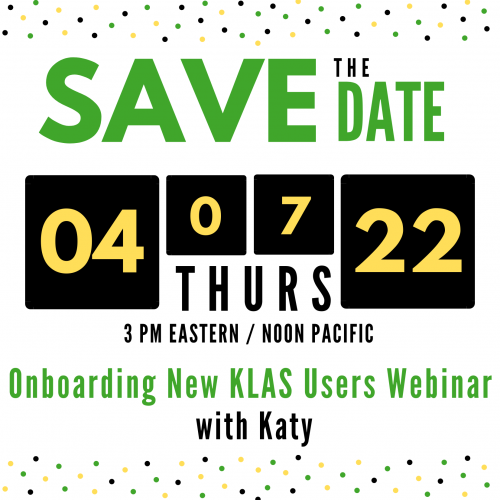
The KLAS Users Program Committee and Keystone are excited to share details about our next two online training and networking opportunities. Please let us know if you have any questions about either, or any other training opportunities (such as KLAS Administrator Training).
Keystone-Presented April Webinar
What resources are available to help new users get up-to-speed on KLAS, and what is still needed? Come find out what's on offer and provide your suggestions and requests for future offerings at our April Keystone-presented webinar.
- Date: Thursday, April 7, 2022
- Time: 3:00 PM Eastern / Noon Pacific
As usual, the Zoom link and dial-in number for audio will be provided in the KLASusers Knowledge Base approximately one week prior.
May KLAS Users' Online Mini-Conference
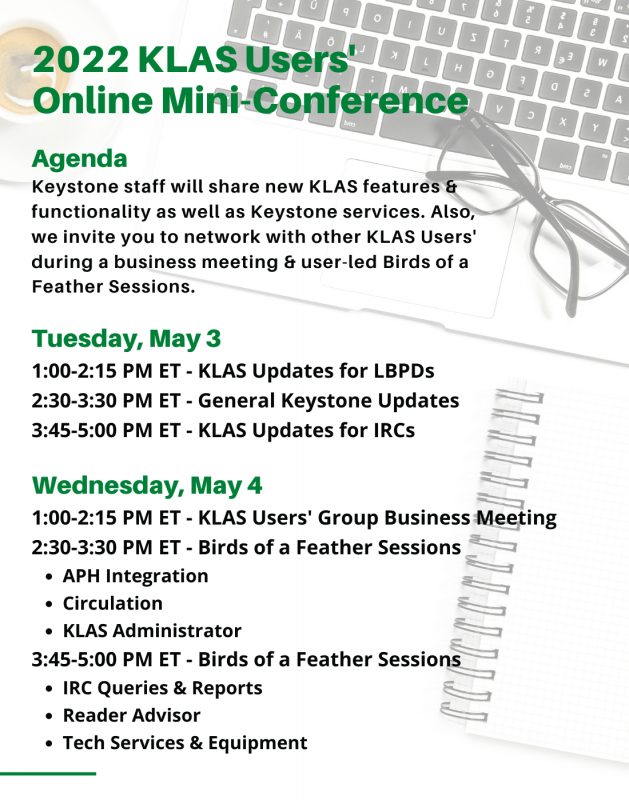
The KLAS Users' Group Program Committee is excited to announce the dates and planned schedule for the 2022 KLAS Users Online Mini-Conference to be held May 3-4. Tuesday's sessions will be presented by Keystone staff and Wednesday's will be presented by various KLAS Users.
We aimed to include topics that will appeal to all aspects of the KLAS Users' Community, so be sure to mark your calendar now and don't miss this fantastic online training and networking opportunity!
- Dates: Tuesday, May 3 - Wednesday, May 4, 2022
- Time: 1:00-5:00 PM Eastern / 10:00 AM-2:00 PM Pacific
Mini-Conference Agenda:
Keystone staff will share new KLAS features & functionality as well as Keystone services. Also, we invite you to network with other KLAS Users' during a business meeting & user-led Birds of a Feather sessions.
Tuesday, May 3
1:00-2:15 PM ET - KLAS Updates for LBPDs
2:30-3:30 PM ET - General Keystone Updates
3:45-5:00 PM ET - KLAS Updates for IRCs
Wednesday, May 4
1:00-2:15 PM ET - KLAS Users' Group Business Meeting
2:30-3:30 PM ET - Birds of a Feather Sessions
- APH Integration
- Circulation
- KLAS Administrator
3:45-5:00 PM ET - Birds of a Feather Sessions
- IRC Queries & Reports
- Reader Advisor
- Tech Services & Equipment
Registration:
Registration is not required, but it will give us an idea of how many attendees plan to attend. Also, persons who register will receive an email approximately one week before the mini-conference with all the agenda, Zoom links, and dial-in for audio numbers.
-
APH KLAS Users' Meeting Highlights & Updates
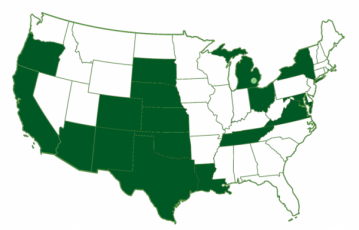
Hello, IRCs and IMCs!
I hope you were able to join us at the KLAS IRC / IMC Users' Meeting at the 150th APH annual meeting, but if not, we’ve got you covered. Read on for a couple highlights, and info on where to find more.
KLAS IRC / IMC Installs by State
7.6r2e Highlights
The latest version of KLAS includes some IRC / IMC-specific updates, especially to WebOrder. Here are a couple examples:
- Added a "My Account" link in the Main Menu of Web Order to allow a user to view their own record.
This does away with the need for that confusing “self” relationship. Users are now able to access their own record via the “My Account” link in the Main Menu instead of by searching for themselves. While this is a small change, we think it’s a big improvement!
- Added a "Change Patron Status" function
The new screen launches from a button on the Main Details screen and allows a user to request a status change and provide a reason.
For example, a requestor can change a former student’s status to Moved, with a reason of “moved to another district this summer.” If the new district registers the student, it will be easier to tell that it’s the same child and not just the same name. Plus, even if the new district is out of state, the student will already be correctly updated to remove them from the former district's APH Census count.
We can hide this button if you prefer the users contact you directly for all status changes. But if you choose to allow it, this is a great way to make updates quick and easy for both you and your requestors.
For more information about these updates and more, check out the KLAS 7.6r2e Full & Web Functions Release Lists.
7.7r1 Highlights - to be released Oct 2018
This upcoming KLAS release has quite a few behind-the-scenes adjustments that should make the staff-side KLAS application a little faster and better all around. For example, it will not require Admin Privileges to install, eliminates the need for Open VPN for remote users, and it supports more “special characters,” such as diacritics.
More Info
To learn more about the latest and upcoming updates, and watch demos of some of the new IRC features, make sure you’re logged in to KLASusers.com and check out the 2018 APH KLAS Users' Meeting Recording. (You must be logged into klasusers.com to access the article.)
Don’t have time to watch the recording? The 2018 APH KLAS Users' Meeting article has the PowerPoint slides available for download!
-
Are you Ready for Duplication? (And is your Catalog?)

Whether you’re chomping at the bit or dragging your feet, sooner or later Duplication on Demand service will be coming to all NLS network libraries. As we get deeper into implementation processes at more and more libraries, we want to make sure we’re sharing what we learn with the rest of you, to help things go as smoothly as possible.
A big thing that we hope you’re hearing is that the time to work on your cataloging is now.
As you switch your patrons to Duplication service, they will very suddenly have access to your entire catalog of DB titles. That includes:
- Almost a decade of Retrospective titles, which you may not have done any cataloging for since no copies were ordered or expected.
- Anything and everything from Copy Allotment that you requested only 1 copy of, because it wasn’t a subject your patrons had much interest in.
- All of those titles you returned all of your copies of through the XESS process.
This can and will be a huge benefit to your patrons, as they will be able to receive their requests and reserves faster than ever, read series in order, and have access to all the classics and old favorites they may have had trouble getting before.
It can also have its pitfalls, especially if your catalog hasn’t been kept up. But don’t panic! You still have time to fix things.
Take a look at your catalog, and come up with a plan. If you have questions or need help strategizing, we’re here to help!
Some things to check on or try out:
Is this subject set up in your catalog and applied to titles that you don’t want circulating except on request?
- No Local Subjects
Make sure your back catalog can circulate (or be excluded!) appropriately. Run a “PDQ – Missing MARC Tags” to find titles with few or no 690s.
- Missing Exclusion Subjects
The Merge Queries feature in version 7.7 enables you to query for information that isn’t on a record, and this is a good time to use it! Run a query for books with “Strong Language” in the annotation, and select any result to get the search into your “recent queries list. Then, run a query for books with your strong language subject code or codes (likely SL). Use merge queries to subtract the second search from the first, and you’ve got a handy list of books that need their exclusion added! (Then, you can do the same for violence and sexual content.)
This version 7.7 feature will help you apply exclusion headings from the Rating Unrated Books project, or add new Local Subjects to appropriate titles quickly and easily.
- Series Info
As you add new books to those long, sprawling series... take that as a reminder to do a book search for the series and see if those older titles are cataloged as part of the series, or if its missing some of its lower numbers. Also take a look at the Link Titles screen: titles listed there will count as HasHads for the listed title.
- High Demand Requests
The “HD Titles – Requests” report can help you find titles with many outstanding requests. The listed titles (especially those with a high requests-to-copies ratio) are likely to see a big spike in circulation; make sure the cataloging is good so they can keep going even to patrons who didn’t think to ask for them.
- Outdated Requests
Do your patrons remember what they requested 3 years ago? 10 years ago? Think about how far back you want to serve request lists, and let us know if you want to clear out some of those ancient requests.
-
ASCLA Awards & Keystone

ASCLA / KLAS / NOD Award
Did you know that Keystone Systems has sponsored the ASCLA / KLAS / NOD Award annually since 2004?
Actually, your first question is probably, "What is the ASCLA / KLAS / NOD Award?"
In 2000 the Association for Specialized and Cooperative Library Agencies (ASCLA) and the National Organization on Disability(NOD) began providing a $1000 award and certificate of recognition for a library organization that developed or expanded its services for patrons with disabilities, specifically through a specific project or change in physical and / or attitudinal barriers to an effort to make their library services more accessible and inclusive. Originally sponsored by Aetna Healthcare, Keystone Systems assumed sponsorship in 2004.
Each year a Keystone representative attends the ASCLA Awards reception at the ALA Annual Conference in support of the recipient and to help present the award. This year the Gwinnett County Public Library in Georgia will be honored for its Removing Barriers Project.
From the American Library Association's press release:
The Removing Barriers Project mission is to strategically identify and address issues that might cause a person to hesitate using their public library. Library staff were charged with identifying who was not currently coming through their doors and then reaching out to area organizations to understand their barriers and actively work to remove them. Project results include a thoroughly updated Accessibility Center, sensory storytimes in each branch, an early opening day and time for families with children on the autism spectrum, and dedicated programs offering a social and educational experience for community members who are developmentally disabled.

The Library’s Strategic Plan for 2015 through 2018 calls for engagement of all segments of Gwinnett’s population and set the organization on a course to actively remove barriers and expand partnerships with community-minded groups and organizations. A major activity to address this goal was the complete renovation of assistive technologies housed in the Lawrenceville Branch. Adjustable height tables, JAWS software, a Prodigi reader that allows a customer to select reading with magnification or listening, an Intel Reader that converts text to digital text, then reads it aloud, high contrast keyboards, and a braille reader highlight the equipment added to the Assistive Technology Center.
The Gwinnett County Public Library’s Removing Barriers Project will be honored at the ASCLA Achievement Awards Ceremony on Saturday, June 23, 2018 from 8:30-10:00am at the ALA Annual Conference in New Orleans.
Congratulations to the Gwinnett County Public Library! You can see a list of all award recipients on the ASCLA Achievement Awards Page.
Francis Joseph Campbell Award
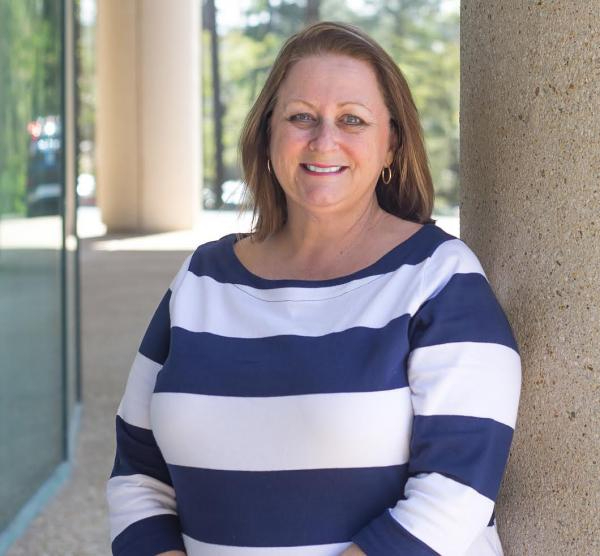 While Keystone does not sponsor this award, we do feel we have a special connection to it. Our annual Julie Klauber Award is named after the 2002 honoree who was the Librarian at Talking Books Plus Outreach Services a part of the Suffolk Cooperative Library System in New York. The Francis Joseph Campbell Award is given annually to "a person or institution that has made an outstanding contribution to the advancement of library service for people with physical disabilities and/or physical impairments".
While Keystone does not sponsor this award, we do feel we have a special connection to it. Our annual Julie Klauber Award is named after the 2002 honoree who was the Librarian at Talking Books Plus Outreach Services a part of the Suffolk Cooperative Library System in New York. The Francis Joseph Campbell Award is given annually to "a person or institution that has made an outstanding contribution to the advancement of library service for people with physical disabilities and/or physical impairments".The 2018 recipient is Pat Herndon, Director of Georgia Library for Statewide Accessible Services (GLASS), who was selected for her leadership in library service for patrons who need accessible books and media. We are proud to say that GLASS is a KLAS library and was the local host of the 2017 KLAS Users' Conference.
From ALA's 2018 Francis Joseph Campbell Award press release:
“Patricia has led a reorganization of the GLASS’s statewide service and implemented a new strategic plan, but it is her leadership and vision in developing an innovative training event for library staff that has done the most to advance library service for the blind and physically handicapped in Georgia”, said nominator Julie Walker.
“While awards are often given for innovative and/or new projects that garner accolades and attention (and Pat has several of those to her credit), the dedicated professionals at the Center for the Visually Impaired (CVI) who serve and train individuals who are blind or visually impaired want to recognize Pat for her leadership, strategic vision, and hard work to make library services available to all who need them regardless of geographic location in the state”, said Fontaine M. Huey, President, Center for the Visually Impaired.
Pat will also be honored at the 2018 KLAS Achievement Awards Ceremony at ALA Annual on June 23.
Other past Francis Joseph Campbell Award recipients who were staff at KLAS libraries include:
- 2013 Jill Lewis, former director, Maryland State Library for the Blind and People with Physical Disabilities
- 2012 Carole Rose, Indiana Talking Book and Braille Library (retired)
- 2010 Daniel W. Boyd, former director of the South Dakota Braille and Talking Book Library
- 2002 Julie Klauber, librarian, Talking Books Plus, Outreach Services, Suffolk Cooperative Library System, Bellport, NY
- 2001 Barbara Mates, head of the Library for the Blind and People with Physical Disabilities at the Cleveland Public Library
-
AT Reference Document
Whenever someone starts using KLAS with a screen-reader, we offer specialized training to help them get set up, oriented, and working.
However, as we all know, it's tough to really learn KLAS in just a few days. Plus, even for experienced users, it can be tricky going back to a task you haven't done for a while. Both of these can be an even bigger challenge for our users who work with screen-readers, due to the increased amount of memorization required. The Keystone Customer Support team is always happy to help, but for those who just need a little more context to get back on track, we have a specialized Assistive Technology (AT) Reference document that could be just the thing!
This reference is intended as a supplement to the built-in User Guide and our general How-Tos and Quick Tips. For each module in KLAS, the document gives an overview, contextual information, and relevant key commands.
If you or an AT user you know need an update for this document, the download links below have the freshest, up-to-date version. Hot off the press, in a manner of speaking! And we'll be sure to keep it updated, so whenever you get a KLAS upgrade be sure to check the Documents -> Quick Ref page of KLASusers to see if there's a new version!
Hint, hint: KLAS 7.7 will definitely call for an AT Ref update! That version will be posted as soon as it's available.
One last thing -- as you may notice, this thing is a bit of a beast to update. So, if you note any missing or incorrect screens or functions, please drop me a line! It's important to me to provide useful assistance for our users, so I'll appreciate the heads-up and get the correct information into a new version ASAP.
-
Automatic Status Updates for Duplication-Ready Titles
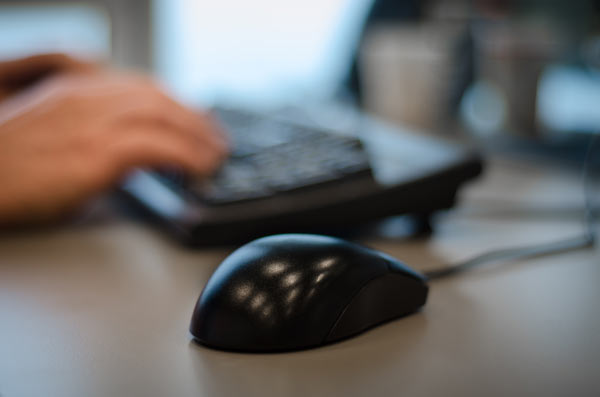
We just released a new feature to help Duplication-on-Demand libraries keep their catalogs up to date!
From the 7.7.50 Release List:
You can now choose to have titles automatically updated to an Active status when you add an eDoc, just as you can have titles make themselves Active when you add the first physical item.
But let’s talk a little bit more about what this can do, and who will want to use it.
We expect this will be primarily for libraries using Duplication on Demand, and especially the ones who are (or will soon) be going collectionless. If you don’t have physical copies of anything or have very few physical copies, it only makes sense to make everything you can duplicate “Active.”
Even if you still have a physical collection, if most of your patrons are getting DoD will they be confused that some titles are listed as Active and some are Download Only? Once you zero out your copy allotment, do you want new titles to linger in “In Process” status long after you start duplicating them for patrons?
If any of the above has you thinking, “yes, I want to use this feature!” here’s what to think about...
- What title statuses should update when they get an eDoc?
- What status should they update to?
- What about the back catalog?
What title statuses should update when they get an eDoc?
Open up the catalog and look at the list of Title Statuses. Are there ones that shouldn’tbe over-written, like Withdrawn? If there are titles you purposefully removed from your collection (Ex: outdated medical information or obsolete guides to the internet) we don’t want to accidentally resurrect them.
If you have a Special Order Only or similar status, do you want to keep those titles segregated? Or if you’re duplicating at full steam, are you ready to fold the ones you can duplicate back into Active?
When you’re ready, send us the list of statuses that should be updated by this feature.
What status should they update to?
I mostly talked about the feature updating duplication-ready titles to Active, but that isn’t your only option. Any status other thanWithdrawn can be duplicated, so it won’t cause problems if you do want to keep these titles under a different status. You could do an “Active – Duplication” or “Active for Digital” title status. Or, you can put them under “Download Only” if you have that labeled clearly for your OPAC (something like “Available for Download or Books on Demand”). And, of course, if you’re changing things to Download Only, that shouldn’t also be in your list of statuses to be updated.
Figure out what makes the most sense for your collection and your patrons, and tell us what status titles getting their first eDoc should update to.You can also let us know if you want to set up a new title status or re-label any of the existing ones on your OPAC.
What about the back catalog?
Once you’ve set both your statuses to be updated and the status to update them to, those rules will automatically apply whenever a title gets its first eDoc. But what about any titles that already have an eDoc but are lingering in a no-longer-accurate status?
We have a program we can run through your batch manager to clean those up! We’ll want to run it sometime when you aren’t doing anything in the catalog module, to avoid any conflicting record locks. Most likely, we’ll run it overnight or early in the morning before you get to work.
Just bear in mind that it can be messy to try to undo this kind of thing, so do your best to be sure about the changes you are making before telling us to run the cleanup.
-
Back to School: How 3 KLAS IRCs Prepare
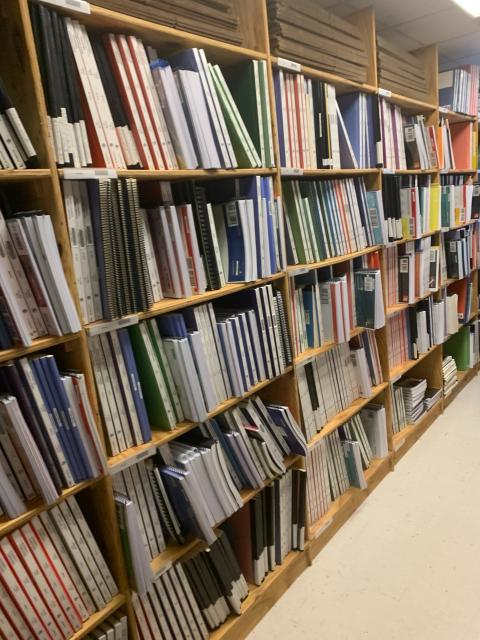
Every Instructional Resource and Material Centers throughout the nation is trying to do the same thing, and that is to make sure that every student with a visual impairment has what they need. In the month of August all schools will be returning to session, this means a stress test of all our processes and practices. There is no one size fits all for resource centers, we all meet the need in our own way. But, there is power in discussing how we do what we do. It gives the space for others to be creative with ideas they may have not thought of. At the very least we might not need to re-create the wheel because our neighboring state might have an amazing solution to the problem that we are facing. Below are three narratives of how Oklahoma, Colorado and Arizona prepare for the summer and the start of the school year:
From Pepper Watson, Oklahoma Instructional Materials Center:
Around the first week of May, we send out an email asking for the names of all graduating seniors. In June, we also do a query for seniors and compare lists to see who is actually graduating and who will remain for Adult Studies. We then make sure all graduating seniors have returned all items checked out to them. At this point, we either mark them GRADUATED and delete their account from our system (required by our State Dept of Ed) or contact the TVI about items still needing to be returned.
All textbooks are due back to the AIM Center by June 15th so the first thing we do at the beginning of June is find out what books have not yet been returned and send out notices to those TVIs. (Most of our school districts get out May 15th so we have most materials back by the end of May).
During June we also conduct inventory on all 5822 shelves in the AIM Center. I have a staff of four and it takes us all of June to get this completed. Upon completion, we run an inventory report and begin to restock our shelves for the next school year. (We do this throughout the year, but we concentrate efforts now when school is out, and we have a bit more time).
I, personally, do a lot of KLAS maintenance during this time. Everything from lost items to creating new equipment and textbook holdings to updating patron records. If we have a copy of the new APH catalog, I also use this time to update prices in the vendor catalog in KLAS. This saves a bit of time later down the road and also gives me an idea of how much price increase we are dealing with overall. (This year the price increases have been steep, especially on textbooks!)
I divide my federal fiscal year into quarters on my calendar. I then divide my total FQ funds by 4 and make note on my calendar how much I should have spent by each of these dates. I started doing this about 7 years ago and it’s an easy way of tracking funds, so we aren’t going crazy the last month to spend all of our money. We are very fortunate in that we have moveable shelving and have a lot of storage space. Therefore, we can keep our shelves stocked and have very little wait time to get products out to our students.
From Jim Olson, Colorado Instructional Materials Center:
Start early: CIMC has a book order deadline of April 1st every year. For example, the deadline for 2022-2023 book orders was April 1, 2022. We will accept book orders any day of the school year, but do not promise that the TVI will have even one volume of braille if the order is received after the deadline. Of course, we do everything possible to fulfill every book order no matter what time of year it is received. This puts some responsibility on the TVI to coordinate with the classroom teachers to ensure book orders are submitted in a timely manner.
CIMC staff tracks which students typically receive books from us and will reach out to TVIs if they have not ordered books for their student by the deadline. TVIs are busy people! They have a lot on their plate, caseloads change often, and students move around. Contacting the TVI if they have not placed book orders for a particular student saves the CIMC and the TVI a lot of stress later on.
Ship book orders to districts before June, if possible, if we are pulling from our inventory or if the vendor is able to fulfill our order early. A lot of our TVIs like this because they know they have the book waiting for their student when school starts in the fall. This also lessens the workload for the CIMC staff in August since we have already shipped. We try to clarify with TVIs when they place the order whether or not we can ship during the summer months. Making a note in the Material Request module of Klas regarding dates we can or cannot ship for a particular order has helped us stay organized. If you make the note when you create a new order (in the shipping instructions box) it will print on the packing slip. Easy for staff to identify if we are shipping or holding the order. We also put the email address of the TVI who is receiving the book in the shipping instructions box. Any time we ship orders we send a quick email to the TVI so they know to be watching for the shipment to arrive.
Mid-July: Contact braille vendors who still have open orders. Run PO/Requisition listing report in Klas. If possible, we try to let TVIs know the status of their open orders before school starts.
From Jared Leslie, Arizona Instructional Resource Center:
We begin the conversation with teacher in our districts when we begin the Federal Quota Census. In January when we are sending notice about the census, we include language about best practices of thinking for the next school year. This could mean preparing for your equipment needs or your textbook needs. After the census is fully completed in March, we begin our conversations that are singularly focused on equipment and textbooks.
This email notification shares with all teachers what items are checked out including consumable items. Then the teacher indicated what items we expect back at the resource center for inventory and quality checks. If an item or text is going to be utilized next year or over the summer teachers have the option of renewing a checked-out item. After the renewals we begin to start receiving the returns, we get about 2,500 to 3,000 different items that are returned during this time. It takes us about 4-5 weeks to fully process the returns after they are all fully received. At that same time, we are fielding new equipment orders and new textbook orders. Our Quota orders do not get filled/ordered until about halfway through the summer. Our textbooks start ASAP.
Once returns are completed and all our titles are placed with our transcribers, then preparation for shipping begins. The space that we used for receiving returns transitions to a staging area for outbound shipping. We pre-box up all of the items that have been requested waiting for the week for when teachers return. Once we have a confirmation of the teacher work week in a district, we then ship out the completed orders. This allows for items to have less of a likelihood of being lost or misplaced.
As students arrive, this prompts another ordering wave, which is considerably smaller than the summer wave. But, because of this fact we need to maintain some capacity for item fulfillment and braille transcribers.
-
Bestsellers by Decades

This is a guest post by Maureen Dorosinski, Librarian / Production Supervisor, Florida Bureau of Braille and Talking Book Library Services.
The question:
Meagan from FL1M had a question: “Do we have exclusions for certain dates? Many of our patrons are auto select from their preferences, but only want books from a certain time period.”
Nancy at KLAS suggested we could set up subject codes based on dates. For example, instead of putting everything in the "Bestseller" category, a Bestsellers of the 1990s, Bestsellers of the 80s, category.
First Stop:
Nancy completed a process of setting up the bestseller codes for the various decades. She set the following in place, and filled them:
- BEF50 / BEN50 - fiction and nonfiction prior to 1970
- BEF70 / BEN70 - fiction and nonfiction from 1970 - 1979
- BEF80 / BEN80 - fiction and nonfiction from 1980 - 1989
- BEF90 / BEN90 - fiction and nonfiction from 1990 - 1999
- BEF00 / BEN00 - fiction and nonfiction from 2000 - 2009
In putting these codes on the titles, she also removed the generic BES, BEF and BEN codes, so what is remaining in those subject headings are the more recently published titles.
Second Stop:
Since NLS uses an amalgam of LA Times, New York Times, USA Today, and Washington Post bestseller lists to tag books, our cataloger Dina took things to the next level and further populated these tags from NLS by searching all the New York Times Bestsellers, and adding the appropriate subject headings to previously unnoted bestsellers.
To streamline the process, she went to Bookshare.org. They have a section of the top 10 fiction and non-fiction titles from the NYT list, these lists round up the titles without repeating them, and can be filtered by year and month.
Going Forward:
Nancy says the automatic codes being used are BES, BEF and BEN. When MARC records come in, those are updated. If, in your review, you see a recently added title that was originally published in 1970, you might want to add the 1970 bestseller code to it, but other than that, those should stay pretty static. And yes, remind the RAs that these categories exist, for either selection or exclusion.
Maybe another library could continue, Dina says we'll have to add subject headings for the 2010s and (eventually) the 2020s and assign them as appropriate. Maybe you will share their queries with us to import!
Get Bestsellers By Decades at Your Library:
I have attached the text queries with all the books we have tagged in each of the categories. To apply them in your catalog:
- Add the new subject codes as listed above to your catalog using Headings Maintenance.
- Import the first query file.
- Use the Change Headings - Query Set tool to apply the new heading to the Query Set and remove the old heading.
- Repeat for each of the query files.
I’m sure KLAS would help out if you need them!
Downloads:
Thank you!
Maureen in FL -
Coming Soon: Duplication on Demand Roundtable
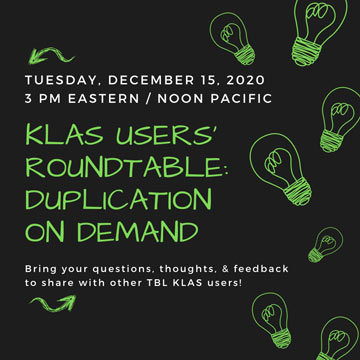
"Duplication" is the word of the day / week / month / year for National Library Service for the Blind and Print Disabled network libraries. Whether you've already made the fundamental shift to providing duplication on demand materials for your patrons or are still trying to make decisions about how to shift your library to a duplication on demand service model, there's many questions, decisions, and challenges faced during the process.
With this in mind, the KLAS Users' Group Program Committee is providing another opportunity for KLAS Users' to come together in a session focused on this topic. Go ahead and mark your calendar now for the upcoming KLAS Users' Roundtable: Duplication on Demand to be held on Tuesday, December 15 at 3 PM Eastern / Noon Pacific.
Note: We expect this session to last two hours rather than the usual one. Also, we plan to record this roundtable and post it to klasusers.com for later reference.
During this roundtable, three representatives of libraries using Gutenberg and three representatives of libraries using Scribe will each discuss their experience implementing duplication equipment, decisions regarding policy and staff changes, and more! After each shares a brief description of their process, there will be an opportunity to ask questions, discuss issues they've brought up, etc.
Gutenberg Panellists:
- Hope Williams, Nevada Talking Book Services
- Elke Bruton, Oregon Talking Book & Braille Library
- Ricardo Cisneros, San Francsico Public Library - Talking Book and Braille Center
Scribe Panellists:
- Connie Sullivan, South Dakota Braille & Talking Book Library
- Angela Fisher Hall, Alabama Regional Library for the Blind and Physically Handicapped
- Nancy Holt, Idaho Talking Book Library
Before the roundtable...
To help you prepare for this roundtable we encourage you to review Duplication Info Quick Reference page where you will find articles, quick tips, how-to documents, and more related to using either Gutenberg or Scribe. Several of the documents have just been updated to reflect changes in recent versions of KLAS, so make sure to check those dates to make sure you have the most current info!
You can also help our panellists prepare for this session by posting questions to this KLASUsers Discussion Forum post. Of course, day-of questions are also welcome, but posting your questions ahead of time will ensure that we get to them (even if you can't make the session itself) and that the panellists will be able to consider their answers.
Access Info:
Tuesday, 12/15/2020 @ 3pm Eastern Time / Noon Pacific
To connect:
Google Meet Link: meet.google.com/rmv-fgvs-ebaDial-in audio option:
US +1 575-459-0037
PIN: 950 920 249# -
Conference Wrap-up
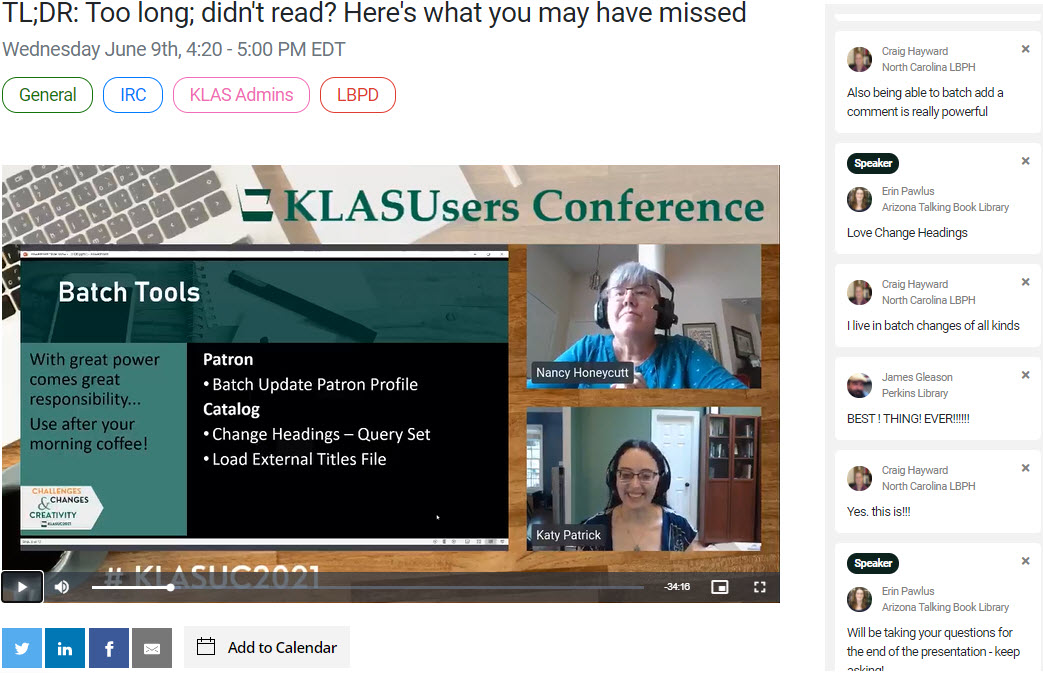
The 2021 KLAS Users’ Conference is over... but if you didn’t get to all the sessions you hoped to (or if you just miss us already) the online event portal is still open!
You can revisit any session page to view the recording. Also, be sure to scroll down to the bottom of the session page to download the chat transcript, slide deck, and any other handouts. The chat features are still live as well, if you have any Private Messages you haven’t answered yet or want to ask additional questions of our presenters. If you aren’t ready to put your headphones back on yet or need a month’s break from PowerPoint before you can stand to look at another slide, that’s fine too—the event portal will be there for you until March 2022.

In addition to reviewing the conference content, keep an eye on your inboxes for a follow-up survey. This information will be especially valuable this year, since this was our first-ever online conference, and since the Users' Group will be considering whether to hold virtual conferences again in the future.
In the meantime...
Thank you! Thank you! Thank you! to everyone who attended the conference, and especially to those who presented a session, moderated a roundtable, or just joined in the discussions. Your contributions are so valuable, both to the KLAS Users’ community as a whole, and to us as well. In the final count, we had 261 attendees and 44 speakers (including Keystone staff) for our 38 conference session.
I hope you came away from the conference with new ideas and a better understanding of KLAS. On Keystone’s side, we have a long to-do list and a ton of excitement from hearing how you use KLAS, where we can make things better, and what your priorities are.
While I’m sorry I didn’t get to grab dinner or drinks with any of you, or gather around the coffee dispenser to rev up for the day, I’ve still come away from the conference with the renewed enthusiasm stemming from really seeing how your work impacts others. You are all out there doing amazing things, and I’m so glad we get to be a part of and help support it.
Finally, if you have questions or need assistance with anything you learned at the conference, don't hesitate to use the Support button and let us know! We know you all had a ton of new info thrown your way, and we're happy to help make sense of it all wherever needed.
-
COVID-19 and North Carolina LBPH
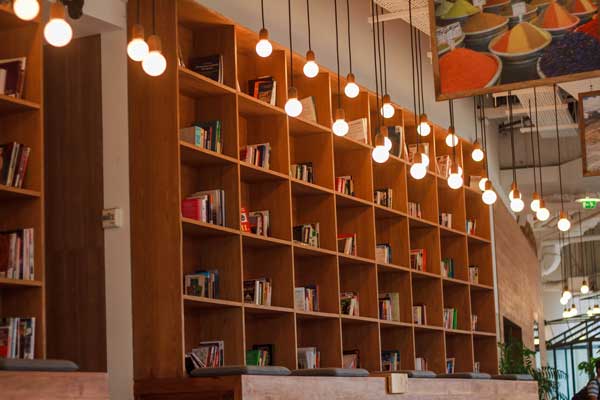
Our KLAS Users' Group officers contacted some KLAS users to ask them to share how their library / organization is faring and what policy, service, or other changes they may have enacted in response to library closure or limited staffing related to Covid19. We welcome submissions from any KLAS user who wants to share their experience during this time. Please contact Chandra Thornton, President, KLAS Users' Group or Drea Callicutt, Keystone Systems if you're interested in contributing a post.
Our next guest post in this series is from Craig Hayward, Systems and Digital Services Librarian at NC LBPH.
North Carolina in a time of COVID 19
North Carolina started hearing about what was happening in Washington State, and their library staff, in late February-early March and thanks to the information that the library there provided, we started preparing for how to quarantine items and figuring out how staff could work either from home or in socially distanced situations in the library. The most difficult part of the situation in planning would be with our circulation staff of 5 who most of what they do is handling physical items and have to work in close physical proximity for some parts of their work? Still a plan was set in motion and we prepared to transition to whatever we would be presented. The second week of March, the library closed to the public officially. This also meant the volunteers were not allowed into the building, making some of the work we do, in inspections and audio narration more difficult.
On March 23, 2020, the Governor of North Carolina gave the Stay At Home Order, mandating that all employees were to work from home, or go on administrative leave, if they could not do any work at home. A week prior to that, my own county (Durham) had issued the order which meant that I would have to start working from home sooner. At the time, 5 of us had already begun teleworking, leaving most of our staff of 25 in-house working, while plans were made to bring our work home for real. There was a large backlog with the state in getting laptops so staff could work from home, so a number of staff brought in their own laptops, while waiting frantically for the state to get them something more “official”. All of this was so that KLAS could be installed and work could happen from home. This would mark a new chapter for many of what work looks like now.
Needless to say there was a big shock to the system, both for staff and patrons. No one is there to answer the phone, just reply to voicemail and email. Ironically, the library is getting a new phone voice over IP phone system, but the shutdown happened at the absolute worst time in this project, since the old system offers no way to forward calls on. The new system will allow you to easily forward your office number to your cell phone. The only time I’ve been back to the library since the shutdown began was this past Tuesday to test out a new piece of hardware to make sure it worked. In the meantime, special arrangements have been made to get the library’s main phone line to ring to another one at the State Library so voicemail could be collected and accessed by our staff.
Without anyone available to run duplication on demand orders on cartridge, that service sits awaiting our return. Our only answer is to get patrons setup on BARD and / or use the local downloading resources we have. To keep chaos at the post office as minimal as we could, we asked patrons to hold onto their materials until we were open again. But patrons can only respond as they do and material piled up in the mailing facility. As a result we then started an occasional truck run to pick up mail hampers. The first run, amazed our driver with the number of hampers sitting and waiting to return materials to the library.
Since our shutdown, only 3 staff members, myself included, have even entered the building at any point for any amount of time. No one is allowed back in until we open. Even once we open, the number of people allowed in the building will be done in phases. Phase 1 allows for a max of 8 people in the building at any given time. Staff will rotate days in and out. At the time of this writing, we are closed to the public and staff until further notice, potentially until the end of May.
Staff working from home pick up voicemail messages from a central voicemail box, setup temporarily by the State Library, and return calls. They also monitor and answer the library’s email box. For anyone answering we ask that they block their phone numbers for privacy. If the patron does not accept blocked calls, we do our best to work to relay information. One option we have looked at for greater transparency is a Google Voice number that would be branded with State of North Carolina to keep it private. But that’s temporary and may take some time. We look forward to the day we get our new voiceover IP phone system to help keep our teleworking experience more normal by allowing our office numbers to connect while out of the library, but our temporary solution has allowed us to continue serving our patrons during a difficult time.
Once a week either the Director of the library or the State Librarian makes a trek to the library and retrieves new patron applications, faxes, and bits of other mail. These items are worked on by our Public Service staff from home.
Our volunteers will return when the public does. Book and magazine production in our local recording studio has been put on hold. However, a couple of us on staff are using home recording as an option (voice recording apps on mobile devices, Audacity on laptops) to produce "Tar Heel Talk", the library’s newsletter. This is a particularly popular publication for our readers. We have also turned to revamping our audio offerings with making "Tar Heel Talk" into a podcast and creating a new podcast that showcases locally recorded books and magazines available for download. With "Notable On NOBLE" we give listeners a bit of the annotation and the first 2-3 minutes of the first chapter of a book or a magazine articles to encourage patrons to try out some more materials and at least offer them something to read. This joins the already popular "Heard Any Good Books Lately?" Podcast and a couple of new offerings are coming soon.
Our machine unit sits and waits to fulfill machine requests, until the library opens again. Machines are received by mail and brought into the library with other items from the post office. All machines have a 7-day quarantine period, so the time away has helped in this regard.
On this topic when we were opened the standard quarantine period for books was 3 days. This will continue once we return and for the foreseeable future. One benefit of the shutdown is that we have decided to ramp up duplication on demand efforts and when we return many individual digital talking books cartridges will be withdrawn from the collection and set aside for recall rather than checking them back in.
Some bright spots have come out of this situation, also. First off, we have the implementation of Live Chat on our library’s homepage. In these times when it’s hard to reach staff directly by telephone and email, this service acts like a kind of instant messaging service to allow staff to help patrons get books and directly answer questions about our service and happenings in real-time. Staff were hesitant that patrons wouldn’t use it, but it has been well received. It also has helped strengthen our collaborative efforts with the State Library by adding our library to this service. They can now more easily direct people that come to their side back to ours, and it allowed us to evaluate the product they use for accessibility. It also has led to some interesting real-time conversation with patrons and their appreciation of having a way to connect.
Most of our staff have been working on the larger NLS Unrated Books project while working at home. This time out of the library has meant having to fill in gaps and this situation is useful.
Another project that this pushed forward was a mass migration of groups of staff-direct, non-automation, service patrons. Having the time out of the library to do this has been a real help. The bulk conversions to duplication service have happened and then the reader advisors (when not answering questions) have been able to go in and tailor first run service queues for a batch of around 1800 patrons new to this type of service. This has made this project more manageable.
This has also been a chance to update parts of our website to better serve our patrons. Things like our local download site, NOBLE, and creating new service spaces with an expanded and better organized podcasts section.
On the topic of local collections, we’ve been able to have time to transfer our collection in totality from our local network attached storage device to books.klas.com for better access by our 3 Scribe units once we go back to open operations. At this writing we have just gotten approval (in record time) for adding a 4th Scribe unit, so that we will can keep up with the demand of daily orders (which average around 300 per day) and keep a walk-in service for patrons, once we are allowed to reopen our building to the public.
It has accelerated the use of communication tools like Microsoft Teams. Prior to this situation no one really saw a need for it, other than our administrative team since they were having meetings and they had been communicating daily. Now everyone in the library uses Teams at various levels. Some of us talk daily through it directly with various people the way we would normally go down to each other’s offices and have conversations. Having my Director call me through Teams the first time was quite a surprise in my house.
Zoom meetings have become a more regular happening, rather than a special occasion. They are just the way we have larger meetings of groups, from the entire staff of the State Library to Departmental meetings within our own building, and for planning events like an upcoming retirement party.
The other avenue that opened up for communication has been a regular Wednesday check-in for groups of staff by text message. This is something that will stay around while we continue to telework and probably beyond as we operate with greatly reduced staffing in the library building itself.
Overall, I can’t say that the situation happened at an ideal time. Conferences got postponed and face-to-face time with staff is missed greatly. But perhaps this situation could be a catalyst for changes to the program that were already starting and maybe for a change in attitude about virtual (non-physical) materials services, like downloading and talking to staff through a website for our patrons.
Every major event that happens and changes us culturally has an impact of how life goes on after ward. Once you get used to this way of working and living, it’s hard to go back to the way you did things prior.
-
COVID-19 and Tennessee Resource Center for the Visually Impaired
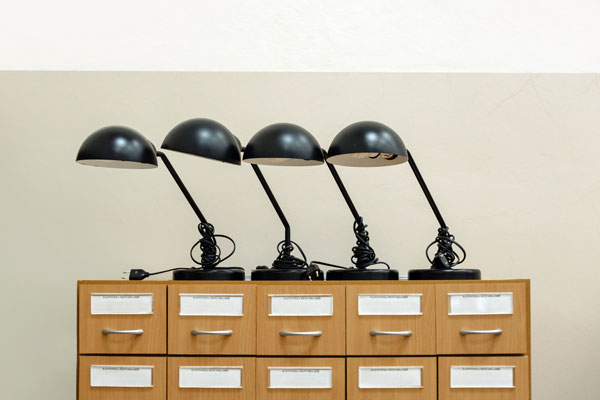
Our KLAS Users' Group officers contacted some KLAS users to ask them to share how their library / organization is faring and what policy, service, or other changes they may have enacted in response to library closure or limited staffing related to Covid19. We welcome submissions from any KLAS user who wants to share their experience during this time. Please contact Chandra Thornton, President, KLAS Users' Group or Drea Callicutt, Keystone Systems if you're interested in contributing a post.
Our next guest blog post in response to this request is from Kathy Segers, Director of Accessible Instructional Materials and Outreach Services, Tennessee Resource Center for the Visually Impaired.
TN RCVI COVID-19 Plan Implementation
As a result of the COVID-19 Pandemic, Tennessee RCVI and Outreach Services, has developed a detailed action plan to support local school districts to be able to continue to serve students with visual impairments, by providing accessible instructional materials and devices to the district and or the parents. The following is an outline of the activities that have been put in place.
- A copy of the TN RCVI COVID-19 Guidance was sent to all Directors of Special Education and Teacher’s of the Visually Impaired in March of 2020.
- A copy of the TN School for the Blind Outreach Department Guidance was sent all Directors of Special Education and Teachers of the Visually Impaired in March of 2020.
- TSB Outreach teachers are working with each local school district that they serve and are offering support for the students on their caseload which focuses on providing access to the instructional materials that the district is using. This is based on guidance from the TN Department of Education.
- Local districts were asked to share their home contract information to facilitate communication while everyone is working from home. This was well received.
- Local districts were asked to order materials needed by their students at home using KLAS. They were asked to submit the parents address where the student materials needed to be shipped before placing the orders so we would have time to enter the data in KLAS. Students names were not used to protect privacy. This has worked very nicely.
- TN RCVI has shipped on demand APH Materials and equipment that students were previously using in their local school districts to the homes of students for them to use to have access to the materials used by the local school districts. For example, if they used a Perkins Brailler or Matt Connect prior to the Pandemic, we would ship one to the home if the student could not gain access to the one at school. No new devices that the student has not previously used are being sent at the present time.
- TN RCVI has sent daily information out the parents, TVI’s, and LEA’s about accessible trainings for teachers and students, i.e., free JAWS/Zoomtext for student until June 2020, APH ExCEl Academy Training for Students with VI, Etc.
- RCVI just launched its May Newsletter, ACCESS VI with instructions for ordering and returning materials.
New protocols for sanitizing equipment and books that are returned to TN RCVI have been developed are being used following EPA and CDC guidelines - All staff at TN RCVI are wearing gloves and masks when in the building and are socially distancing, We are trying to have only one or two staff members in the building at one time for now.
If you have any questions about our COVID-19 Response, please contact me at
-
COVID-19 and the Arizona Talking Book Library & Instructional Resource Center
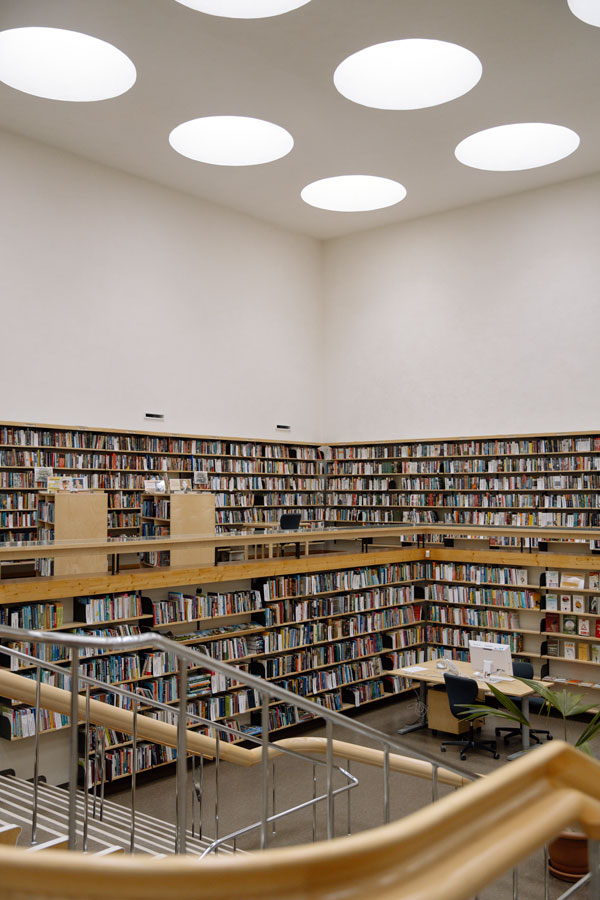
Our KLAS Users' Group officers contacted some KLAS users to ask them to share how their library / organization is faring and what policy, service, or other changes they may have enacted in response to library closure or limited staffing related to Covid19. We welcome submissions from any KLAS user who wants to share their experience during this time. Please contact Chandra Thornton, President, KLAS Users' Group or Drea Callicutt, Keystone Systems if you're interested in contributing a post.
Our next guest post in this series is a collaborative one from Erin Pawlus, Assistant Administrator, Arizona Talking Book Library, and Jared Leslie, Director of Media Services, Foundation for Blind Children.
Our teleworking adventures at the Arizona Talking Book library began on March 23, 2020. At that time, we had about half our staff working on site on an alternating schedule, with the rest working from home. Since then, we have managed to pare it down to about 5 people in the building at a time. Other than the regular trill of phone calls, it has been remarkably quiet. At the time of this writing, we are closed to the public through May 15, 2020, so we encourage our readers to contact us by phone or e-mail.
So, who will you find if you were to tour our library? A supervisor is always on site, as well as someone to forward phone calls. Staff who work from home pick up their voicemail messages and return calls. They are currently using their cell phones and we ask that they block their phone numbers for privacy. If the patron does not accept blocked calls, someone from the office will act as the messenger in those cases and relay information. We are exploring our options for improving phone service while teleworking, but our temporary solution has allowed us to continue serving our patrons during a difficult time.
The Certification Specialist, and staff providing backup, review incoming applications to confirm eligibility a few times a week instead of daily. Since the Reader Advisors are not in the office to receive the applications, basic contact information is entered into KLAS so that the librarians have enough information to call and set up service.
Our volunteers have not yet returned to the library, so book and magazine production in our local recording studio has been put on hold. However, our Studio Manager is back in the booth to narrate Arizona Highways magazine. This is a particularly popular publication for our readers.
The machine agents are available by phone at their home offices to accept requests for equipment and to assist with BARD. Twice a week, the Machine Services Supervisor comes in to prepare mail shipments.
While mail service for books has continued, it has been necessary to decrease the number of materials that we send each day so that we can limit on-site staff and maintain social distancing in the mailroom. We started with a maximum of 650 books a day – a far cry from the 2000 we typically allowed. With a little tinkering we were able to move the needle back to 1000 and have struck a decent balance. We also quarantine books and machines for seven days before they are available for the next patron, which is another important step that has nonetheless slowed down mail processes.
We were soon alerted to an interesting consequence of not serving all patrons needing books every day. While we understood that it may take several more days to ship, patrons were calling in who had not been served in weeks. When we reviewed the issue with Keystone, we discovered that it was because we were giving priority to patrons who were Nightly List Only and being served from specific book requests, leaving the Nightly Autoselect patrons being served by general reading interests to languish and the end of the list. In a normal world, this makes sense – if a patron has specific requests, they should be served before the patron who is happy with what we have in stock. However, this is not a normal world. We switched the order and gradually chipped away at our backlog.
The sudden and unexpected changes to our schedule and workflow have accelerated other projects, however. For example, our agency had provided training on Microsoft Teams starting late last year, but we were not quick to make it a part of our daily routine. Now, we all stay in regular contact through chats and virtual meetings.
Our library has also received the Scribe for duplicating multiple books on a cartridge. We had completed a staff and patron pilot and were starting to introduce it to patrons as they called in with book requests. As our traditional mail service slowed, we offered it to our patrons as a quicker option - we have been able to maintain a next-day turnaround for these orders. While it has been a unique challenge to launch a new service during an uncertain time, many patrons were willing to give it a try. Since early March, we have transitioned over 900 patrons and currently mail out an average of 160 cartridges a day!
We stay in contact with others in our community and partner organizations. Our Instructional Resource Center for Arizona, The Foundation for Blind Children, and the Arizona State School for the Deaf and Blind, continue to request print/braille books that are produced by the National Library Service. Our Youth Services and Engagement Librarian has worked with Teachers of the Visually Impaired (TVIs) to create weekly virtual programs for their students. She also plays with the recently purchased Cricut machine to prepare tactile cut-outs for the upcoming Imagine Your Story Summer Reading Program.
We asked for an update from the Instructional Resource Center for Arizona and they informed us that they began teleworking on March 16, 2020. At a full capacity, they have nine people that are on site supporting thousands of students throughout the state. Most of the team utilizes a desktop computer, so like most organizations they had to secure more laptops to allow for remote access. However, their tech and inventory department was able to secure them the weekend before telecommuting began. Within a day of their tech department receiving the much-needed workstations they were able to get one in the hands of every team member.
Onsite they limited the number of staff to two and had the remaining seven work from home. Each day the staff members on site rotate. This system has allowed for many unintended benefits. They have two main functions: 1.) Producing physical braille and mailing that to districts and customers. 2.) Pulling federal quota items and mailing them out to districts and students. Having rotating team members allowed for cross training for every team member, and those that had specialized roles now were coaching how others could jump in and help.
Everyone has found a way through with trial and error and continue to discover new or different ways to do business. We are not sure what everything will look like in the future, but we have picked up some valuable new skills and a shifting perspective on what is possible... more than we could have imagined. I am encouraged by my staff and our patrons, who have demonstrated amazing grace and resiliency during a high-stress time. Listening to the voices, and sometimes the tears, of our patrons on the line has made it clear to me how truly essential this program is in the lives of the people we serve.
-
COVID-19 and the California Department of Education Press

Our KLAS Users' Group officers contacted some KLAS users to ask them to share how their library / organization is faring and what policy, service, or other changes they may have enacted in response to library closure or limited staffing related to Covid19. We welcome submissions from any KLAS user who wants to share their experience during this time. Please contact Chandra Thornton, President, KLAS Users' Group or Drea Callicutt, Keystone Systems if you're interested in contributing a post.
Our next guest blog post in response to this request is from Jesse Medina, Manager of the California Department of Education Press.
CDE Press has been the publishing unit of the California Department of Education (CDE) for over 50 years. Until last year, CDE Press operated completely out of headquarters, located in Sacramento, California. I have been with CDE Press, in various capacities, for almost 14 years. Ever since I started, CDE Press staff could only fulfill orders on computers at work and customers had to call, email, or even fax their orders in. After years of trying to move our sales online, we finally completed the transition in August 2019. CDE Press was finally able to provide 24 hours a day/7 days a week access to our customers all over the world. It ended up being perfect timing for what would happen in 2020.
When the direction from the CDE Executive Office to try and telecommute as much as possible in March, CDE Press would be equipped to handle the needs of customers while also allowing staff to work from home. It took a few days for staff to get used to (me included) but I am thankful that we were in position to be able handle this transition as smoothly as we did. A lot of credit goes to my staff, who were willing to take on different tasks, be available at odd hours, and work with our customers to accommodate their needs and situations as best as we can.
On a personal note, I have been appreciative of this time that I get to work from home. My wife has been working from home for several years so she was used to it. I get to spend more time with her and our three dogs. They love to go back and forth between the office and where I work to supervise us. Sometimes they even show up, both visually and audibly, in my virtual meetings. We also live close to both of our parents and have been able to share those resources that have been in short supply these past few months. We try our best to support our local restaurants and businesses as we know they are having a tough time with the restrictions.
With my staff, my family, and work, I am very thankful and consider myself very lucky! I hope you all stay safe and healthy!
Jesse Medina, CDE Press Manager
-
COVID-19 and the Florida Braille and Talking Book Libraries
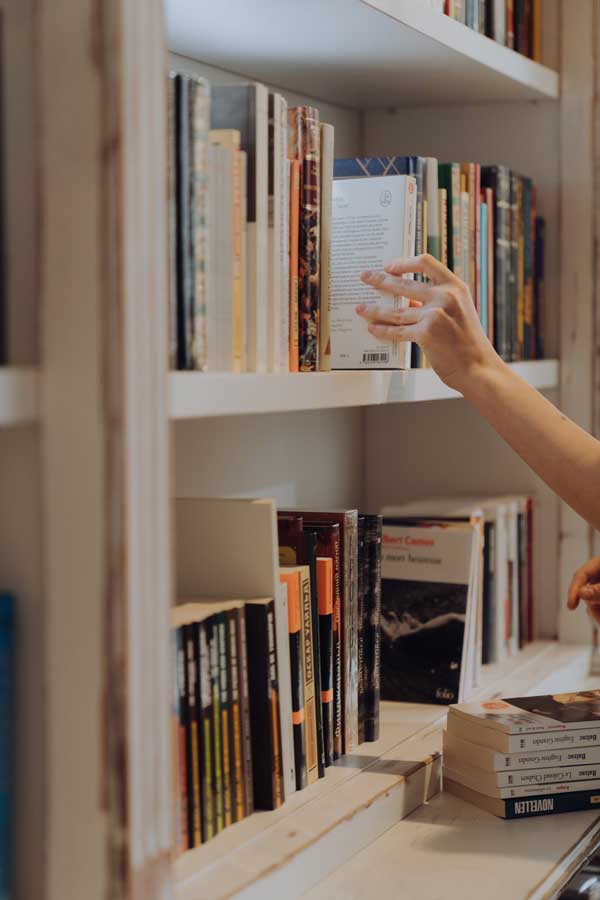
Our next guest blog post in response to this request is from Maureen Dorosinski and the various regional librarians of Florida.
FL1A
The Library is part of the Division of Blind Services, which is under the Florida Department of Education. First the school closings came, then the stay at home order. We were told to telework as much as possible. We were an 'essential service'. Our circulation and production staff core duties are not able to be performed remotely, while reader advisor services and other responsibilities could be performed remotely. Others applied for telework, trying to find a way to be out of the library around people, but without enough leave to cover the duration of the stay at home order. We have vulnerable category staff. Additionally, our OPS part time staff in circulation, had decided to simply take unpaid leave. This left circulation extremely short handed. About half staff, when we were already two positions short. The outlook is bleak and morale is low because now there is a hiring freeze and one position is on hold. One production staff member worked in both areas simultaneously.
Then, COVID came to the library. We were told "someone in the building tested positive", and were given the last date they were in the library, the details were not clear but then, the staff just cleared out. We are behind and had been shifting quarantine back, and also, had been operating day to day as to who was in and able to do what.
All we can do now is wait until April 30 and see if there are any changes. Staff have contacted me frantic and desperate to get more information...and I have none to offer. I wonder myself what if someone tests positive in this time. Do I trust these results will be disclosed? What do I do for myself, and my family, if I have vulnerable people in my life?
After I wrote this, I opened it up this morning, Friday, April 24. Some else on campus has tested positive, and now we are out until May 7. That above scenario was again repeated when we were told we needed to close because someone else tested positive on campus, rehab center staff, and then we adjusted the reopening times twice. Luckily KLAS staff as well as subregional staff were able to help button up the day, and redistribute service throughout the rest of the open libraries. A good deal of patrons will be able to be served with the FL network pulling together!
Rereading my notes, everyone is even more confused, and my morning was consumed with getting information and timesheets and testing sites, and creating telework tasks for those who do not have any sort of technology at home, nor a job that has a real remote counterpart and looked up and breathed and just hoped everyone turns out okay.
On service to patrons: Kim Peters at FL1D had a great idea, to ask for a report of patrons who have met their limit so she could go into their accounts and raise their limits right away. John Owen pulled together such a report, and she was able to raise many patrons so service would continue. He then did a similar thing for FL1A, and we are applying it as well. Thousands of patrons will now have service continue uninterrupted, while their returns wait at the post office, or on our loading dock in quarantine, until we get back into the office. For patrons that had reached their NSCutOff after January 1, 2020, we would raise their limit by 10 books. This would target those patrons most likely to benefit from the increase, those that are most active. Patrons not at their NSCutOff yet are being served by open libraries now and books received after April 22nd will be from those branches. Once the books are returned and checked in these patrons will be eligible for more service.
All of the SRLS who are open, are to be commended for their willingness to help by raising their card run limits in order to serve Florida. We are so grateful for their dedication and extra work during this time:
- FL1G, Sarah Smedley and her team in Palm Beach County
- FL1H, Bill Forbes and his team in Broward County
- FL1K, Debra Martin and her team in Brevard County
- FL1M, Megan Magee and her team in Pinellas County
- FL1L, Greg Jackson and his team in Escambia County, West Florida Public Library
The same gratitude goes to the entire KLAS team as well, especially John Owen and Nancy Honeycutt.
-Maureen Dorosinski, FL1A Librarian
FL1C
Meeting patrons needs by mail during Coronavirus
Due to the high rate of COVID-19 cases in Miami-Dade County, the Miami-Dade Public Library System closed to the public on March 18, 2020. On Thursday March 19th my supervisor contacted me about the possibility of using our Borrow-by-Mail service to send out the backlog of holds that customers were unable to pick up due to branch closures. Borrow-by-Mail is a fee based service that allows patrons to place requests from our catalog and have them mailed to their home address for a $4.00 fee. It was decided that we would waive the fee and start asking branches in groups of 3-4 to call the patrons, ask if they want their holds shipped and ship the books to our Books-by-Mail and Borrow-by-Mail Departments called Connections. Connections is located at the North Dade Regional Library right next to our Talking Books Department. I supervise both departments.
We manage Borrow-by-Mail using Polaris and a Neopost machine. It is a slow process but we can incorporate tracking numbers which are listed in the patrons record. It is also nice because Polaris generates mailing labels and a letter with instructions. It was decided we would eliminate tracking numbers to speed up the process since we were not charging for the service at this time. We processed about 140 items over three afternoons before we were sent home on March 24th. After we were sent home, a team of employees were asked to report to the Main Library and branch staff were asked to check out the holds that patrons wanted and send them to Main to be mailed out. They decided to bypass the Borrow-by-Mail function to expedite the processing. Hundreds of holds were sent out by the staff working at the Main Library.
While that was happening, one of my staff from Connections, one from Talking Books and myself were set up with a laptop with remote access to our desktop so we could start placing requests for patrons. We discovered KLAS and Polaris worked surprisingly well this way. The first day I was able to access KLAS, I began having the Talking Books phones forwarded to my personal cell and I received over 30 calls. Many of the patrons were extremely concerned about the well-being of the staff. They were also tremendously grateful that we were taking requests and that other libraries around the state would be shipping items out.
Unfortunately, I began receiving calls and emails that some of our patrons had not received the Borrow-by-Mail holds they had been expecting. As it turned out, a large shipment was sent to Connections shortly before we were sent home and arrived after we had closed up. Doris, my Connections Manager and I ventured back into North Dade Regional and shipped 178 items to 76 customers in 7 hours. Then, I started receiving calls from Talking Books customers stating they weren't receiving their cartridges. Well as it turns out, some of the Talking Books has been assigned to FL1C by mistake. Maureen Dorosinski from Daytona and John Owen from KLAS ran a report for me and we were able to assign the items to an open library.
On Friday April 17th, Post Office informed us that they had to start delivering our mail at North Dade Regional again due to the large quantity of items. Twenty crates of cartridges were delivered on Friday morning and two more shipments were on the way. Four of my staff (3 pages and one librarian) and myself plan to report to North Dade Regional on Monday April 20th to get a handle on the backlog. More to come....
-Jennifer Shipley, Library Operations Manager
Miami-Dade Public Library SystemFL1D
The list John prepared for me is excellent as it identifies all those already maxed out. I've already increased NS cutoff for about 70+ patrons and have about 200 more to go. Most are folks who only get a couple of books a week and had low cutoffs of 12 books. I am catching it in time as most got their last delivery last week.
I've been so worried about my patrons having books and this is a blessing!
-Kim Peters
FL1M
Our policy changes have been: no one except staff in building (including volunteers we have had to pick up their work), stay 6 ft apart, Wednesdays off except printing and mailing the run, we also had to suspend our cleaning service and have been assigned many cleaning duties to keep the building running.
Our stats have changed because we no longer are having people "walk-in" as patrons, but our phone number and email count have been through the roof. Way higher than normal. The staff have been slammed with so many patrons asking for 10, 20 books at a time because they are locked in their rooms in nursing home facilities and it is the only thing they have to do. Staff have been doing their best to keep up with the new high demands, but they are definitely feeling a strain and are having to push through the weariness. One of our staff has been out for 10 days because she had a fever. She was tested for Covid-19 and the test results came back today, four days after her test as negative.
Personally, it has been a strange transition with new information and policies changing daily. It is mentally taxing, and there is so much work to be done. I am sad to say there are even times I have felt unsafe at work simply by having to leave my house and see coworkers from a distance in the building due to what the media and CDC have deemed as safe. It is tiresome because I live with one other person who has been working from home since March 12th. I am the only person in my household who interacts with other people. I will be fully responsible if I get my household sick. This is a scary weight I have been carrying everyday I come to work. I had to decide what was worth it to me. I decided my job was a worthy cause worth doing and that as long as we were expected to show up, I would. I know every person who is working during this time is probably going through something similar.
One silver-lining has been the patrons are more grateful than ever. They claim we are saving their lives by providing something to do while they are stuck in their nursing home rooms with no one and nothing to do. Hearing them be grateful has been the best part of this whole experience.
Thanks!
-Meagan Magee
Talking Book Library Services Coordinator
Pinellas Public Library CooperativeGood morning. Emails and phone messages sent on Wednesday are answered on Thursday due to limited Wednesday service. We have 3 office staff currently pulling now, so we are fine! We are more than happy to help out. A mail card limit of 1500 a day is fine. 1200 yesterday and 606 today.
Phone is off the hook nowadays and I do about 20 patron ILLS a day now and there are 3 of us!
We are staying afloat. God Bless you guys in Daytona!
-Juliet Relyea
Public Services Specialist
Pinellas Talking Book LibraryFL1K
We are still operating as usual. Our volunteers are not allowed to come in.
FL1L
With the exception of a dip immediately following the WHO's pandemic declaration, circulation has risen on a year-to-year comparison by week.
Stay well, everyone!
-Chris Hare
Senior Librarian
West Florida Public Libraries
Page 2 of 9

